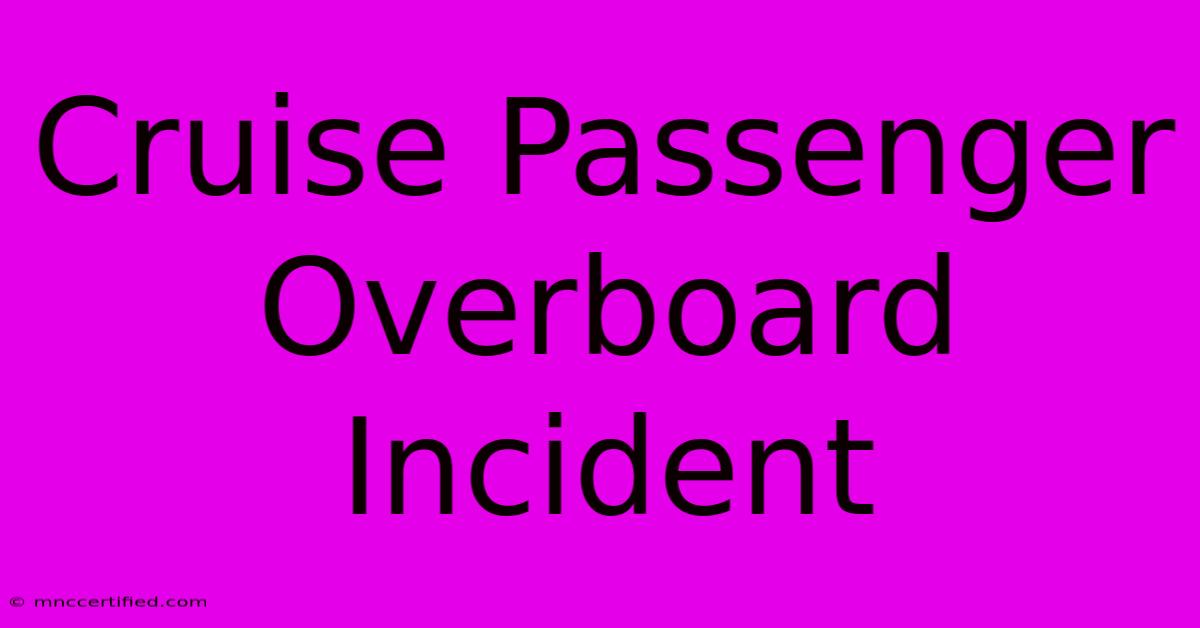Cruise Passenger Overboard Incident

Table of Contents
Cruise Passenger Overboard Incident: Prevention, Response, and Legal Ramifications
Cruise ship vacations are supposed to be relaxing escapes, filled with sun, sea, and unforgettable experiences. However, the horrifying possibility of a passenger going overboard casts a long shadow over the idyllic image. This article delves into the critical aspects of cruise passenger overboard incidents, examining prevention strategies, emergency response protocols, and the legal consequences involved.
Understanding the Risks: Why Passengers Go Overboard
Several factors contribute to passengers falling overboard. These incidents are often tragic and preventable. Understanding the contributing factors is the first step towards effective prevention.
Common Causes of Overboard Incidents:
- Alcohol and Drug Use: Impaired judgment significantly increases the risk of accidents, including falls overboard.
- Insufficient Safety Measures: Inadequate railing heights, poorly lit decks, and lack of safety awareness campaigns contribute to accidents.
- Medical Emergencies: Sudden illnesses or incapacitation can lead to falls, particularly if unattended.
- Suicide Attempts: Sadly, some overboard incidents are deliberate acts.
- Accidental Falls: Trips, slips, and falls, often exacerbated by weather conditions, account for a significant number of overboard incidents.
- Entering restricted areas: Passengers venturing into unauthorized areas increase their risk of accidents.
Prevention: A Multifaceted Approach
Preventing overboard incidents requires a comprehensive strategy involving cruise lines, crew members, and passengers themselves.
Cruise Line Responsibilities:
- Enhanced Safety Features: Implementing higher railings, improved lighting, and more frequent safety inspections are crucial.
- Comprehensive Training: Crew members should receive thorough training in passenger safety procedures and emergency response protocols.
- Effective Communication: Clear and frequent safety announcements and readily available safety information in multiple languages are essential.
- Monitoring Passengers: Especially in high-risk areas or during adverse weather conditions, increased monitoring is necessary.
- Alcohol Awareness Programs: Implementing responsible alcohol consumption programs and awareness campaigns can significantly reduce risks.
Passenger Responsibility:
- Adhering to Safety Guidelines: Passengers should diligently follow safety instructions and remain aware of their surroundings.
- Responsible Alcohol Consumption: Moderation is crucial to avoid impairing judgment and increasing the risk of accidents.
- Awareness of Surroundings: Passengers should always be mindful of their location and avoid risky behavior.
- Reporting Concerns: If a passenger witnesses unsafe conditions or behavior, they should immediately report it to crew members.
Emergency Response: Swift and Efficient Action
When a passenger goes overboard, time is of the essence. Effective emergency response is critical to maximizing the chances of survival.
Immediate Actions:
- Issuing a Mayday Call: The cruise line must immediately initiate emergency protocols and notify relevant authorities.
- Deploying Man Overboard (MOB) equipment: This includes deploying life rafts, lifeboats, and other rescue equipment.
- Initiating Search and Rescue: Utilizing onboard resources and coordinating with external rescue teams is crucial.
- Documenting the Incident: Thorough documentation of the incident, including time, location, and witness statements, is essential for investigation purposes.
Legal Ramifications and Liability
Cruise lines bear significant responsibility for passenger safety. Overboard incidents can lead to complex legal battles involving liability and compensation.
Potential Legal Claims:
- Negligence: Cruise lines can be held liable if their negligence contributed to the incident, such as inadequate safety measures or insufficient crew training.
- Wrongful Death: In cases of fatality, families may pursue wrongful death lawsuits seeking compensation for losses.
- Personal Injury: Passengers who survive but sustain injuries may file personal injury claims.
Conclusion: A Collaborative Effort for Safer Cruises
Preventing cruise passenger overboard incidents requires a collaborative effort between cruise lines, crew members, and passengers. By implementing robust safety measures, promoting responsible behavior, and ensuring efficient emergency responses, we can collectively strive to create a safer cruising environment for everyone. The ultimate goal is to transform the potential for tragedy into a commitment to proactive safety and responsible enjoyment for all.

Thank you for visiting our website wich cover about Cruise Passenger Overboard Incident. We hope the information provided has been useful to you. Feel free to contact us if you have any questions or need further assistance. See you next time and dont miss to bookmark.
Featured Posts
-
Football Usc Defeats Texas A And M 35 31
Dec 28, 2024
-
Oklahoma Vs Navy Recap Midshipmen Win
Dec 28, 2024
-
Oklahoma Vs Navy Horvath Upset
Dec 28, 2024
-
Magas Disappointment Jasmines Musk Ramaswamy Analysis
Dec 28, 2024
-
Brown Leads Kings To Victory
Dec 28, 2024